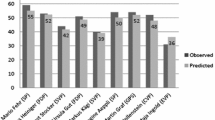Abstract
This paper analyzes learning and voting strategy when a budget maximizing bureaucrat has several chances to obtain referendum approval. The process is modeled as a sequential game with a continuum of heterogeneous voters and a dominant bureaucrat in which all agents are uncertain about the true distribution of voter preferences. The equilibrium concept is perfect Bayes Nash, so voting is strategic in the sense of foresighted but nevertheless noncooperative.
Similar content being viewed by others
References
Cramton PC (1983) Bargaining with incomplete information: An infinitehorizon model with two-sided uncertainty. Rev Econ Stud 51:579–593
Crawford VP, Sobel J (1982) Strategic information transmission. Econometrica 50:1431–1451
Fudenberg D, Tirole J (1983) Sequential bargaining with incomplete information. Rev Econ Stud 50:221–247
Kreps D, Wilson R (1982a) Sequential equilibria. Econometrica 50:863–894
Kreps D, Wilson R (1982b) Reputation and imperfect information. J Econ Theory 27:253–279
Ledyard J (1984) The pure theory of two candidate elections. Public Choice 44:7–41
Milgrom P, Roberts J (1982) Predation, reputation and entry deterrence. J Econ Theory 27:280–312
Morton S (1984) A dynamic revelation analysis: trading for information. Mimeo
Myerson R (1981) Optimal auction design. Math Oper Res 6:58–73
Palfrey T, Rosenthal H (1985) Voter participation and strategic uncertainty. Am Polit Sci Rev 79:62–78
Romer T, Rosenthal H (1979) Bureaucrats versus voters: on the political economy of resource allocation by direct democracy. Quart J Econ: 563–587
Author information
Authors and Affiliations
Additional information
Thanks to R. Gretlein, J. Hamilton, T. Palfrey, T. Romer, H. Rosenthal, S. Slutsky and the referees of this journal for their comments and encouragement. They are not responsible for any errors or omissions.
Rights and permissions
About this article
Cite this article
Morton, S. Strategic voting in repeated referenda. Soc Choice Welfare 5, 45–68 (1988). https://doi.org/10.1007/BF00435497
Received:
Accepted:
Issue Date:
DOI: https://doi.org/10.1007/BF00435497




